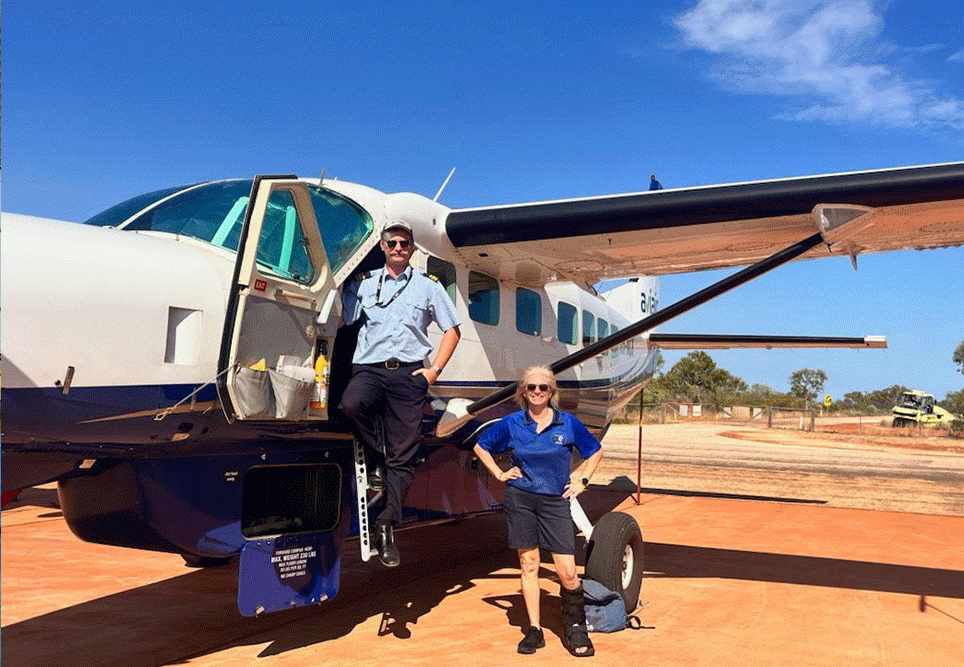This site may not work properly using older versions of Edge and Internet Explorer. You should upgrade your browser to the latest Chrome, Firefox, Edge, Safari, or any other modern browser of your choice. Click here for more information.
Your Stories
This is where we tell your stories, cover topical issues and promote meaningful initiatives.
Advocacy for closing the continuity gap for remote midwives with Donna Stephen
For midwife Donna Stephen, holistic care and continuity of care are paramount for expecting mums. In this article she explains why.
“I see myself as an advocate for flexible and holistic care,” says Donna Stephen, who works in remote communities in the West Kimberley region for the Kimberley Aboriginal Medical Service (KAMS).
“Am I a driver, a social worker, a cook? I’m all that and more,” says Donna who reckons the ever-adapting role of Remote Area Midwife suits her personality perfectly.
“I think I’ve got the best job. Every day for me is a unique journey and holistic care, creating a supportive network for families, can mean many things.
“It includes health education and health promotion in the community as well as providing health services. It’s speaking to a pregnant mum who may also ask about skin sores or other health issues for her other children; it means giving medical advice and support beyond the issues revolving around pregnancy, antenatal and postnatal care.
“Whenever I can, I attend community events to get to know the families, like sports carnivals and health promotion days at school. Community engagement is 100 per cent important. That can also be spending time with groups of women, cooking a curry, putting on face packs.”
Donna is based in Broome and her current job sees her regularly fly 180 kilometres south to the Aboriginal community of Bidyadanga, and drive north out to Beagle Bay, meeting women in the communities on a regular basis, collaborating closely with health workers at the local clinics and other healthcare providers, and involving community resources.
“Daily life is different each day,” she says. “KAMS doesn’t have strict rules about time spent with each patient and this flexibility allows me to prioritise my work to suit each patient’s needs and cater for the number of patients I see on any particular day, which can vary widely.”
Donna’s career as a midwife began at 30, when she said to herself: ‘What am I doing with my life?’ Before that, she worked in banks, working her way through the ranks from teller at 20 to bank manager.
“Once I had my first son, I realised what an honour it was to be a midwife, to be helping women at such an important time in their life,” she says. Donna has now been nursing for 20 years.
After completing her nursing and midwifery training, Donna, her husband and two young sons set off on a trip around Australia and, in those 15 months, Donna got opportunities to work as a nurse/midwife in places like Kalgoorlie and Derby in Western Australia and also in Queensland.
Back in Perth, Donna worked for a multicultural NGO focusing on migrants and refugees. The family always wanted to live in the country, however, and when her husband got a job transfer to Broome “we thought we were the luckiest people on earth,” she says.
The family has lived in Broome for just over 12 years, and Donna has worked for KAMS for eleven of these in various roles – regional coordinator, research and child health nurse – and has visited and worked in many of the clinics in the Kimberley region.
“We talk about holistic care all the time in the health industry,” says Donna. “Midwives know how beneficial it is, and we all want to provide it. It’s not always easy but here, there’s no question of ticking boxes or lip service to the concept.”
The KAMS midwifery model also promotes continuity of care, and Donna regularly meets her patients from early pregnancy through to 36-weeks gestation. At the 36-week point, the women travel to either Broome or Perth to prepare to give birth. Donna then has them back again within days of birth through to eight weeks postnatal (and often beyond).
This goes a long way to help the midwife gain a deep understanding of individual needs and “it’s well recognised that continuity of care improves health outcomes for mothers and babies,” she points out.
Donna’s dream is to bridge the continuity gap when the mothers go to the hospital, to enable remote midwives to attend to women in the birthing suite. But she acknowledges that there are barriers and hurdles to achieve it.
“Research shows that continuity of care is a good thing: with statistics showing, for example, that it results in lower levels of caesarean births.
Donna sees that bridging that gap would also benefit midwives in remote communities, enabling them to keep up their birthing suite skills. She would also like to see student midwives getting more training in antenatal care.
In the meantime, as she continues to advocate for change, Donna spends her time supporting her expectant mothers and continually looking to improve on the service.
Read more stories about the people who work for the KAMS, such as Vicki O’Donnell, OAM.
